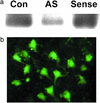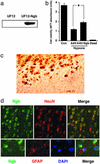Neuroglobin protects the brain from experimental stroke in vivo
- PMID: 12621155
- PMCID: PMC152321
- DOI: 10.1073/pnas.0637726100
Neuroglobin protects the brain from experimental stroke in vivo
Abstract
Neuroglobin (Ngb) is an O(2)-binding protein localized to cerebral neurons of vertebrates, including humans. Its physiological role is unknown but, like hemoglobin, myoglobin, and cytoglobin/histoglobin, it may transport O(2), detoxify reactive oxygen species, or serve as a hypoxia sensor. We reported recently that hypoxia stimulates transcriptional activation of Ngb in cultured cortical neurons and that antisense inhibition of Ngb expression increases hypoxic neuronal injury, whereas overexpression of Ngb confers resistance to hypoxia. These findings are consistent with a role for Ngb in promoting neuronal survival after hypoxic insults in vitro. Here we report that in rats, intracerebroventricular administration of an Ngb antisense, but not sense, oligodeoxynucleotide increases infarct volume and worsens functional neurological outcome, whereas intracerebral administration of a Ngb-expressing adeno-associated virus vector reduces infarct size and improves functional outcome, after focal cerebral ischemia induced by occlusion of the middle cerebral artery. We conclude that Ngb acts as an endogenous neuroprotective factor in focal cerebral ischemia and may therefore represent a target for the development of new treatments for stroke.
Figures




References
-
- Wenger R H. FASEB J. 2002;16:1151–1162. - PubMed
-
- Bergeron M, Yu A Y, Solway K E, Semenza G L, Sharp F R. Eur J Neurosci. 1999;11:4159–4170. - PubMed
-
- Bernaudin M, Tang Y, Reilly M, Petit E, Sharp F R. J Biol Chem. 2002;277:39728–39738. - PubMed
-
- Bergeron M, Gidday J M, Yu A Y, Semenza G L, Ferriero D M, Sharp F R. Ann Neurol. 2000;48:285–296. - PubMed
Publication types
MeSH terms
Substances
Grants and funding
LinkOut - more resources
Full Text Sources
Other Literature Sources
Medical
Molecular Biology Databases

